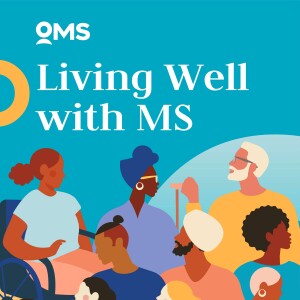
Wednesday Oct 05, 2022
10 mins with George Jelinek: The importance of mindset and support | S4E27
Welcome to the third episode in our short series '10 minutes with George', with Professor George Jelinek. This series marks the 10th anniversary of the charity Overcoming MS.
In this episode, George talks about the importance of mindset, mental health and support from others with MS.
Keep reading for the key episode takeaways and Professor Jelinek’s bio. You can also watch it here.
Make sure you sign up to our newsletter to hear our latest tips and news about living a full and happy life with MS. And if you’re new to Overcoming MS, visit our introductory page to find out more about how we support people with MS.
This is the third installment of a five-part series. Listen to parts one and two.
Bio:
Professor George Jelinek developed the Overcoming MS Program and founded the Neuroepidemiology Unit at the University of Melbourne's School of Population and Global Health which continues to research its benefits.
George’s Story
When George was diagnosed with MS in 1999, he was determined to do something. His mother had died as a consequence of her MS, which spurred him to sort through the medical literature on MS. His career as a Professor in Emergency Medicine and his background as Editor-in-Chief of a major medical journal gave him the tools to do this.
It became clear to George that remaining well after a diagnosis of MS is more than just a possibility. He found that with a commitment to the right lifestyle changes, there is a real probability that many people with MS can live long, healthy lives, relatively free of the usual problems associated with the illness. These lifestyle recommendations are now referred to as the Overcoming Multiple Sclerosis (OMS) Program, which he detailed in his book Overcoming Multiple Sclerosis.
George has remained free of further relapses, as have many people who follow the OMS Program.
Selected Key Takeaways:
Take care of your mental health
(6:04) “If you're going through… struggles, I would recommend talking to someone like a psychologist. Personally, when I first was diagnosed with MS, I had quite a number of sessions with a psychologist to help me understand what I was going through, what my emotions were about, and how that was playing out in the context of my life.”
Others with MS are a great support
(6:49) “Peer support is great for people who are struggling because, let's face it, all of us struggle with things at different times in our lives. There's nothing more helpful in many ways than someone who's been on the same journey and has worked out how to deal with it.”
Health should be included in our top priorities
(10:28) “I was into goal setting and things at the time that I was diagnosed. That was at the age of 45. And I looked back through a number of my goal-setting documents that I produced for myself, and I always left health blank. Now, what does that tell you? Everything else was filled in: work, leisure, finance, you name it, but health was always blank. So, it was an interesting wake-up call for me to get a serious illness.”
While Overcoming MS isn’t currently holding retreats, you can find information about other events we are holding here.
Related Links:
- The OMS Mental Health Hub
- Stories of Hope from other OMSers
- Join an OMS Circle
Don’t miss out:
Subscribe to this podcast and never miss an episode. You can catch any episode of Living Well with MS here or on your favourite podcast listening app. If you enjoy Living Well with MS, please leave a 5-star review on Apple Podcasts or wherever you tune into the show. Feel free to share your comments and suggestions for future guests and episode topics by emailing podcast@overcomingms.org.
If you enjoy this podcast and want to support the ongoing work of Overcoming MS, you can leave a donation here.
No comments yet. Be the first to say something!